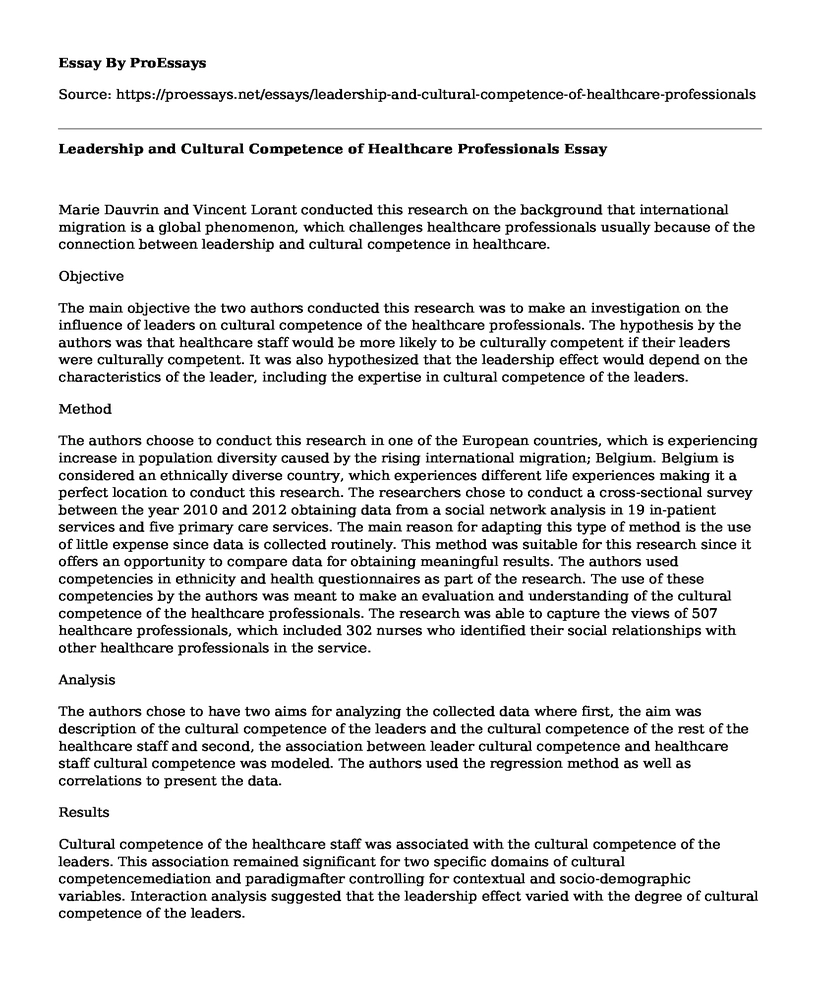Marie Dauvrin and Vincent Lorant conducted this research on the background that international migration is a global phenomenon, which challenges healthcare professionals usually because of the connection between leadership and cultural competence in healthcare.
Objective
The main objective the two authors conducted this research was to make an investigation on the influence of leaders on cultural competence of the healthcare professionals. The hypothesis by the authors was that healthcare staff would be more likely to be culturally competent if their leaders were culturally competent. It was also hypothesized that the leadership effect would depend on the characteristics of the leader, including the expertise in cultural competence of the leaders.
Method
The authors choose to conduct this research in one of the European countries, which is experiencing increase in population diversity caused by the rising international migration; Belgium. Belgium is considered an ethnically diverse country, which experiences different life experiences making it a perfect location to conduct this research. The researchers chose to conduct a cross-sectional survey between the year 2010 and 2012 obtaining data from a social network analysis in 19 in-patient services and five primary care services. The main reason for adapting this type of method is the use of little expense since data is collected routinely. This method was suitable for this research since it offers an opportunity to compare data for obtaining meaningful results. The authors used competencies in ethnicity and health questionnaires as part of the research. The use of these competencies by the authors was meant to make an evaluation and understanding of the cultural competence of the healthcare professionals. The research was able to capture the views of 507 healthcare professionals, which included 302 nurses who identified their social relationships with other healthcare professionals in the service.
Analysis
The authors chose to have two aims for analyzing the collected data where first, the aim was description of the cultural competence of the leaders and the cultural competence of the rest of the healthcare staff and second, the association between leader cultural competence and healthcare staff cultural competence was modeled. The authors used the regression method as well as correlations to present the data.
Results
Cultural competence of the healthcare staff was associated with the cultural competence of the leaders. This association remained significant for two specific domains of cultural competencemediation and paradigmafter controlling for contextual and socio-demographic variables. Interaction analysis suggested that the leadership effect varied with the degree of cultural competence of the leaders.
Research Implications
Cultural competence among healthcare professionals is acquired partly through leadership. Social relationships and leadership effects within health services should be considered when developing and implementing culturally competent strategies. This requires a cautious approach, as the most central individuals are not always the same persons as the formal leaders.
Research limitations
Several of factors, which included the use of cross-sectional design, which precludes inferring causality, limited the research. In addition, it is likely that cultural competence of the leaders may be the result of the average cultural competence of the healthcare staff and not the cause. In other words, it could be that the cultural competence of the leaders represents the cultural competence needs of the service. The research may also have suffered from biasness because of the use of ethnic questions in the study.
In conclusion, the researchers were able to conclude that development and implementation of cultural competence strategies require an appraisal of inter-professional relationships and a reliance on leadership role modeling within healthcare services.
Cite this page
Leadership and Cultural Competence of Healthcare Professionals. (2021, Mar 05). Retrieved from https://proessays.net/essays/leadership-and-cultural-competence-of-healthcare-professionals
If you are the original author of this essay and no longer wish to have it published on the ProEssays website, please click below to request its removal:
- Compare and Contrast Essay on Christian and Postmodern Worldviews in Nursing
- Legislation Testimony of Affordable Care Act Essay Example
- Essay Example on Marijuana, Hemp, Cannabis: What's the Difference?
- Essay Sample on Safety & Health in the Workplace: Ensuring Compliance With OSHA Regulations
- Epidemiology in Nursing - Free Article Example
- Free Paper Sample: HIV/AIDS Cases in Nigeria
- Free Essay Sample on Obesity







